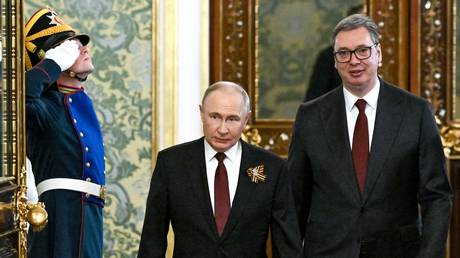"Essential Conditions for Democrats' Return to Power"
Longtime Democratic strategist Doug Sosnik offers valuable insights for the party, suggesting that they should adopt the populist economics championed by Bernie Sanders and AOC.
Doug Sosnik, a veteran Democratic strategist and former top adviser to Bill Clinton, identifies himself as part of the party's centrist wing. Nevertheless, he believes it's time for Democrats to embrace strategies from the progressive left.
“I think that what Bernie Sanders and AOC have been saying — which is really a populist economic agenda — I think that is an important element for the Democratic Party going forward,” he shared during an interview with the Playbook Deep Dive podcast.
Sosnik does not shy away from acknowledging the challenges facing the Democrats during Trump's presidency. He sees an opportunity for the party to reshape its message in preparation for the 2026 and 2028 elections.
“We’re out of power. We can’t get anything done,” he stated. “But at least we need to be able to articulate a coherent narrative about the future that can appeal to the middle class.”
In the interview, Sosnik also named several Democrats he finds interesting as potential contenders for the 2028 presidential race, primarily focusing on governors while also mentioning one senator who likely will not be nominated.
“There are indoor politicians and outdoor politicians,” he explained. “Indoor politicians have a roof over them. They’re senators, they give speeches. Outdoor politicians are people that are out there in the field, they’re in the crowds.” Sosnik advised watching those who engage with the public.
This conversation has been edited for brevity and clarity, curated by Deep Dive Producer Renee Klahr and Senior Producer Alex Keeney. The full Playbook Deep Dive podcast interview can be accessed here.
Turning to a set of slides he created to share with the party and broader political community, Sosnik emphasized the historical context of the upcoming elections. He indicated the importance of understanding the overarching trends affecting the electoral landscape.
“I used to say in the runup to the 2024 election, you can't understand the 2024 election tree if you don't understand the forest that it's sitting in,” he noted. "And it's in real time. It roots back 50 years or so to the early 1970s with the beginning of the decline of the middle class in America."
Discussing the intricacies of the current political situation, he remarked on various strategies Democrats are employing, from Alexandria Ocasio-Cortez and Bernie Sanders mobilizing the progressive base to James Carville urging restraint in response to Trump’s actions. Gavin Newsom's approach includes engaging in conversations with unlikely figures, illustrating the diversity of strategies within the party.
Sosnik said, “The Democratic Party is long overdue for what we're doing right now.” He criticized previous leadership dynamics, stating that the party has not had a clear identity due to years of focusing solely on opposing Trump.
“The organizing principle of the Democratic Party has not been who we are and what we want,” he remarked. He expressed that while current turmoil within the party is troubling, it is not unexpected given the circumstances.
When considering the future, he stated it is imperative for the party to develop a coherent narrative that defines Trump and the Republicans in terms of their lack of support for the middle class. “We can't get anything done. But at least we need to be able to articulate a coherent narrative about the future that can appeal to the middle class,” he reiterated.
Describing a need for a focused agenda, he suggested that the party must address economic issues that resonate with the majority of Americans, particularly the 70 percent without a four-year college degree.
Regarding the upcoming elections, he pointed out the importance of both 2026 and 2028, stating Democrats need to multitask to be politically successful. “We have to define the Republicans and Trump,” he said.
On the topic of messaging, he expressed concern about Democrats' ability to effectively communicate their brand and values. He referenced the need for a clear, appealing narrative around economic populism while defining how the Republican administration's policies impact everyday lives.
Sosnik emphasized engagement with the electorate, stating that “politics has changed significantly,” yet people still desire candidates who resonate with them on a personal level. In his view, “people want happy warriors as candidates.”
Echoing sentiments about authenticity, he noted, “there's an authenticity to what I think is a profoundly horrible human being,” referring to Trump. The issues Democrats resonate with must be relatable to the electorate, especially the economic concerns affecting their lives.
He also analyzed the disconnect between Democrats and certain demographics, particularly lower-income individuals without a college education who may feel alienated from the party. Discussing how to win back those voters, he underscored the importance of aligning the party’s messaging and narrative to address their concerns.
Looking ahead, Sosnik predicts an evolving leadership landscape, highlighting the importance of supporting governors and mayors who could lead the party effectively. He believes leadership should come from authentic voices grounded in community experience rather than traditional establishment figures.
“The country wants new leadership,” he asserted, suggesting a fresh approach is necessary to revitalize the party’s image and connection with voters.
As for the way forward, he called for a focus on economic issues that can win elections, with a keen eye on creating a unified narrative that collectively defines the party's identity.
“Listening to the electorate and adjusting to their concerns, while sticking to our economic message, is essential for any future success,” he concluded.
For further insights and full details of the discussion, you're encouraged to listen to the complete episode of Playbook Deep Dive available across various podcast platforms.As the Democratic Party navigates through its current challenges, the future trajectory will likely hinge on several critical factors, including leadership style, messaging, and the ability to connect with a diverse electorate.
Sosnik believes a focus on economic messaging is paramount, especially given the stark realities faced by many voters today. He emphasized that the party must develop a narrative that not only identifies Trump and his policies but also outlines how the Democratic agenda can positively impact the lives of middle-class Americans. "We have to have a narrative of defining Trump and the Republicans based on what they're doing or not doing to help people in this country," he explained, stressing that the conversation must be grounded in real-world consequences.
Moreover, Sosnik highlighted that engaging with the electorate goes beyond merely rallying support; it requires demonstrating a genuine understanding of their struggles. He mentioned that many voters are beginning to realize how government policies affect their everyday lives, especially in times of austerity or economic downturn. "I believe that an increasing number of people in this country are dependent on what government does for them," he noted, indicating that this dependency could shift perceptions about government effectiveness.
In terms of strategy, Sosnik suggested that the party needs to approach its message holistically. Democrats should craft an agenda that champions economic initiatives—such as raising the minimum wage and supporting middle-class families—while also tackling pressing social issues that resonate with their core constituents. "I think we are better off not talking about social issues, and to the extent that we do, we should try to figure out how to neutralize those issues," he advised, reflecting a desire to streamline focus toward areas that could yield electoral success.
When asked about navigating partnerships and relations with Republicans, Sosnik struck a cautious tone. While he acknowledged that collaboration can sometimes yield bipartisan successes, he also recognized the current political climate's toxicity. "If we can find something to agree on, we should," he said, but highlighted that meaningful collaboration may be challenging given the GOP's governance style under Trump—a factor he believes constrains productive dialogue and mutual cooperation.
In discussing potential contenders for the 2028 presidential nomination, Sosnik pointed to a range of governors and officials who have demonstrated successful governance. He sees promise in leaders who have engaged with their communities in tangible ways, emphasizing that those "outdoor politicians" often resonate better with voters. He also pointed out that the party must explore innovative avenues and personalities that could attract a broader base, suggesting that authenticity and a genuine connection to everyday constituencies can significantly impact a candidate's appeal.
Sosnik’s insights serve as a call to action for the Democratic Party as it faces a pivotal moment. The stakes are high, and how the party chooses to redefine its identity, message, and leaders could significantly alter its political fortunes in the years to come.
As Democrats prepare, focusing on inclusive, pragmatic solutions while addressing voter concerns and broadening their appeal could lay the groundwork for recovery. "We need to create a center of gravity," Sosnik stated, emphasizing the importance of having a cohesive strategy that all party members can rally around.
The political landscape may be uncertain, but the path forward, according to Sosnik, lies in understanding and addressing the real issues voters care about—namely, economic stability and effective governance. The Democratic Party's ability to adapt and innovate will likely determine its success, as it seeks to regain trust and relevance among the American electorate in the lead-up to the crucial elections ahead.
For those eager to dive deeper into this analysis and hear more from Doug Sosnik and others, the full interview is available through the Playbook Deep Dive podcast, where discussions like these continue to shape the narrative around what the future holds for the Democratic Party. Tune in to stay informed on strategies and insights that could influence the upcoming electoral cycles.
Camille Lefevre for TROIB News












